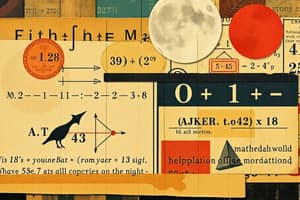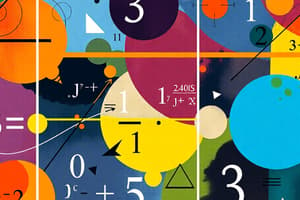Podcast
Questions and Answers
What are the key branches of mathematics and their primary focus areas?
What are the key branches of mathematics and their primary focus areas?
The key branches are arithmetic (operations on numbers), algebra (symbolic representation of quantities), geometry (shapes and space), calculus (change and motion), and statistics (data analysis).
How does algebra generalize the principles of arithmetic?
How does algebra generalize the principles of arithmetic?
Algebra uses symbols and variables to represent and manipulate quantities, allowing for the formulation of equations and general rules that extend arithmetic operations.
What distinguishes Euclidean geometry from non-Euclidean geometry?
What distinguishes Euclidean geometry from non-Euclidean geometry?
Euclidean geometry is based on traditional axioms and theorems in two and three dimensions, while non-Euclidean geometry explores alternative geometries with different axioms.
Define the main concepts of calculus and their applications.
Define the main concepts of calculus and their applications.
What is the role of descriptive statistics in data analysis?
What is the role of descriptive statistics in data analysis?
Explain the difference between inductive and deductive reasoning in mathematical logic.
Explain the difference between inductive and deductive reasoning in mathematical logic.
What are the primary operations defined in set theory?
What are the primary operations defined in set theory?
How do the commutative, associative, and distributive laws apply in arithmetic?
How do the commutative, associative, and distributive laws apply in arithmetic?
Explain how prime numbers play a crucial role in cryptography.
Explain how prime numbers play a crucial role in cryptography.
Discuss a real-world application of discrete mathematics beyond computer science.
Discuss a real-world application of discrete mathematics beyond computer science.
What steps should be taken when developing a plan of action to solve a mathematical problem?
What steps should be taken when developing a plan of action to solve a mathematical problem?
Describe the impact of using software tools in mathematical problem-solving.
Describe the impact of using software tools in mathematical problem-solving.
In number theory, what is the significance of divisibility rules?
In number theory, what is the significance of divisibility rules?
Flashcards
What does number theory study?
What does number theory study?
Number theory explores the characteristics of whole numbers, including prime numbers and their divisibility.
What does discrete mathematics deal with?
What does discrete mathematics deal with?
Discrete mathematics focuses on countable objects like graphs and combinations, often involving logic. It's critical for computer science and decision-making.
How do you solve a mathematical problem?
How do you solve a mathematical problem?
Problem-solving involves a structured approach: understand the problem, gather information, choose a plan, execute it, and check the results.
What tools are useful in mathematics?
What tools are useful in mathematics?
Signup and view all the flashcards
How is number theory used in the real world?
How is number theory used in the real world?
Signup and view all the flashcards
What is mathematics?
What is mathematics?
Signup and view all the flashcards
What is arithmetic?
What is arithmetic?
Signup and view all the flashcards
What is algebra?
What is algebra?
Signup and view all the flashcards
What is geometry?
What is geometry?
Signup and view all the flashcards
What is calculus?
What is calculus?
Signup and view all the flashcards
What is statistics?
What is statistics?
Signup and view all the flashcards
What is logic in mathematics?
What is logic in mathematics?
Signup and view all the flashcards
What are sets?
What are sets?
Signup and view all the flashcards
Study Notes
Fundamental Concepts
- Mathematics is the study of quantity, structure, space, and change.
- It uses logic and abstraction to develop theories and solve problems.
- Key branches include arithmetic, algebra, geometry, calculus, and statistics.
- Mathematics is crucial for scientific discovery, engineering, and technology.
Arithmetic
- Arithmetic deals with basic operations: addition, subtraction, multiplication, and division.
- It involves working with numbers and their properties.
- Fundamental principles include the commutative, associative, and distributive laws.
- Different number systems exist, like natural, whole, integer, rational, irrational, and real numbers.
Algebra
- Algebra uses symbols and variables to represent quantities and relationships.
- It allows for generalizing arithmetic principles.
- Key concepts include equations, inequalities, polynomials, and functions.
- Applications involve solving problems through symbolic manipulation and modeling.
Geometry
- Geometry studies shapes, sizes, and spatial relationships.
- It deals with points, lines, angles, polygons, circles, and solids.
- Euclidean geometry focuses on axioms and theorems in two and three-dimensional space.
- Non-Euclidean geometries explore alternative geometries with different axioms.
Calculus
- Calculus deals with continuous change and motion.
- It encompasses differential calculus (rates of change) and integral calculus (accumulation of quantities).
- Fundamental concepts include derivatives, integrals, limits, and infinite series.
- Applications include modeling physical phenomena, optimizing functions, and calculating areas and volumes.
Statistics
- Statistics involves collecting, analyzing, interpreting, and presenting data.
- It focuses on measures of central tendency (mean, median, mode), dispersion (variance, standard deviation), and probability.
- Inferential statistics uses data to draw conclusions about a larger population.
- Descriptive statistics summarizes and represents data.
Logic in Mathematics
- Logic is fundamental to mathematical reasoning and proof.
- Deductive reasoning uses premises to arrive at conclusions.
- Inductive reasoning gathers patterns and generalizations.
- Mathematical proofs establish the truth of statements using axioms and theorems.
Sets
- Sets are collections of objects.
- Set theory defines operations like union, intersection, and complement.
- Set theory forms the basis for many mathematical structures.
Number Theory
- Number theory studies the properties of integers.
- Prime numbers and divisibility are key concepts.
- Applications include cryptography and other areas.
Discrete Mathematics
- Discrete mathematics deals with countable objects.
- It includes graph theory, combinatorics, and logic.
- Applications include computer science and operations research.
Problem-Solving Strategies
- Understanding the problem is paramount.
- Identifying key information and unknowns is crucial.
- Developing a plan of action including appropriate formulas or strategies.
- Executing the plan accurately and methodically.
- Evaluating the results to ensure they address the problem.
Mathematical Tools
- Calculators and software are important tools for problem-solving, complex calculations, and visualization.
- Spreadsheets and graphing software facilitate analysis of data and visualization of relationships.
Studying That Suits You
Use AI to generate personalized quizzes and flashcards to suit your learning preferences.





